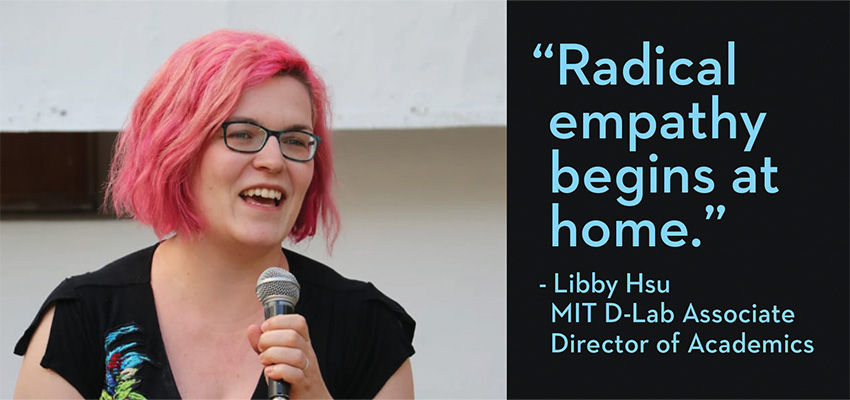
Please join D-Lab in congratulating D-Lab Lecturer and Associate Director of Academics Libby Hsu SM’11 on winning this year’s John S.W. Kellett '47 Award.
The Kellett award “recognizes any MIT individual or group for an exceptional and/or sustained commitment to creating a more welcoming environment at MIT, including but not limited to, improving the experience of lesbian, bisexual, gay, transgender (LBGT), and questioning individuals. The award honors Mr. Kellett, whose spirited support has enabled significant improvements in the lives of members of MIT’s LBGT community.”
In ways great and small, formal and informal, Libby has contributed to the safety and well-being of LGBTQ+ students at MIT by creating a welcoming and inclusive environment for all in her own classes – as well as in the entire D-Lab academic program – by addressing the particular issues that arise for LGBTQ+ students in the context of the international collaborations and travel that are the heart of D-Lab’s work, and by raising awareness and of LGBTQ+ rights and needs within the entire D-Lab staff and community.
There are unique travel and housing challenges for LGBTQ+ students when traveling in areas where laws and attitudes profoundly affect the safety and ease of their travel. In 2018, starting with a trip planned for Terrascope students, Libby led an initiative to create gender-inclusive housing policies for both Terrascope and D-Lab student travel. Following this first effort, she worked with Abigail Francis (MIT's LBGTQ+ assistant dean at the time) to run an identity workshop and brainstorming session at D-Lab with members of both programs, from which she gathered information to draft and finalize the policy for the two programs. The goal of these policies is to mirror MIT's gender-inclusive housing policy to the extent that it is possible while also considering cultural differences, costs, and safety while traveling abroad. When there are safety concerns that affect decisions, Libby is as transparent as possible with the students.
D-Lab has also come to rely on Libby for advice in guidance when choosing the countries where D-Lab works, and the impact of those choices on LGBTQ+ students. She, in turn, has found important guidance from PRISM, a service to which MIT subscribes that provides quarterly assessments on the safety of LGBTQ+ people in every country around the world. Libby stays on top of these reports and ensures that D-Lab staff members and instructors are aware of the critical information they contain and stands her ground when her counsel has meant the need to reconsider a program location.
As always, Libby's policy has been one of honesty and accessibility - she shares the PRISM maps with students and tells them that they can come to talk to her about whether it's safe for them to go to their project country, and, if so, whether it's safe to be open about their sexual orientation while they are there. Her goal is never to tell them what to do, but to be a good listener who can help them decide for themselves, and work with their trip leader accordingly.
Further, she was an early advocate of proactively asking about students' pronouns and using them. She has been an important peer educator and model to other staff members regarding respect for identity and pronoun use. She has researched evolving language practice and seeks to use language in her lectures and slides that is gender-inclusive.
A mantra she often shares with her students is that "radical empathy begins at home." For Libby, this means that while we are interested in social impact and are working with people living in poverty from our relative position of privilege, we too have needs that must be met for us to be able to work effectively on social impact. Libby believes that our empathy towards each other must be rooted in an awareness of our student population's specific needs and identities, and that LBGTQ+ identities are a prominent part of that awareness in the MIT community. As an educator, Libby has worked hard to create a welcoming, non-judgmental space for all!

